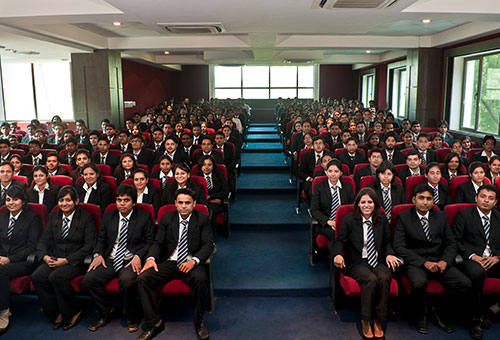- Admission Closed for PGDM (MBA) 2024-26 Batch. Session starting from July 23, 2024
Growing forces of liberalization, privatization, global trade wars and expansionism have substantially intensified competition and companies need to rise to International standards in order to survive and grow. Saturation of domestic markets is compelling companies to enter international markets aggressively for hedging business risks, capturing sizable market shares and adding value to their stake holders.
India is considerably globalized as FIIs are driving capital markets, businesses, trade & commodities. FDI norms have been eased for encouraging investments in several sectors. Given the Indian aspiration of becoming a USD 5 trillion and USD 10 trillion economy in the near future, a deep understanding of IB fundamentals, its guiding principles, impact, consequent challenges and the ability to devise effective solutions are becoming a must for every business student.
International Business is a highly popular specialization and involves application of concepts pertaining to diverse business functions beyond national boundaries. The course at NDIM equips students to analyze developments taking place across international markets, understand industry’s global best practices, develop international business strategies, gain knowledge of tools for formulating investment decisions, identify methods of hedging risks associated with market volatility, formulate trade strategies & execute export operations, proactively address real life business situations and achieve milestones against set objectives.
Students pursuing MBA in International Business as a Specialization choose from a wide range of elective modules including International Marketing Logistics, Managing Cross Cultural Challenges & Business Negotiations, Global Business Management, Risk and Insurance in Foreign Trade, Foreign Exchange Management, Export Import Management and International Taxation.
The course content is highly dynamic and industry oriented. NDIM has a MOU with India China Trade Centre, BRICS Chamber of Commerce & Industry and is on the Board of ‘India Republic of Korea Friendship Society’, thus providing the right environment & support for this programme. New modules are added as and when new international openings are envisaged in emerging areas.
Teaching pedagogy comprises an optimal blend of theoretical knowledge and practical assignments with students mandatorily required to undertake live projects and internship assignments with companies engaged in International Business operations. Case study, practical assignments and projects, role plays, quizzes, group presentations help students better understand complex global issues. Focus is on experiential learning through work on live documents, Government of India portals, websites of International organizations and various trade databases. This gives students the confidence and analytical skills to understand the practical handling of international trade and real-world situations.
Regular interaction and exposure through participation in seminars and workshops at international trade related organizations like FIEO, DGFT, FICCI, CII, ASSOCHAM, PHDCCI, BRICSCCI and other think tanks is organized. The students also manage an IB focussed club which regularly organizes debates, panel discussions, seminars, workshops on emerging international business issues. Students are sent for Live Domestic and International Projects, Internships, Mentoring and Training with senior industry professionals. IB department actively organizes Management Development Programmes and Trainings for the Industry which help the faculty stay connected with recruiters and leading industry professionals and ensure the curriculum is in sync with the latest developments in this field.
Ambassadors from several countries and international trade delegations regularly connect with students on important issues. Some modules are delivered by ambassadors having deep insight in international trade & treaties. These interactions also add tremendous value to the students class-room learning with a practical understanding of real world events, dynamics and contemporary issues.


